
Martina Mariea McBride is an American country music singer-songwriter. She is known for her soprano singing range and her country pop material.
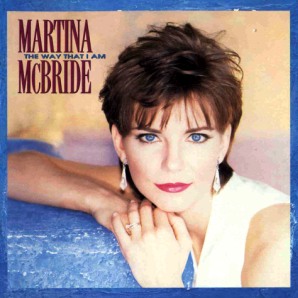
The Way That I Am is the second studio album by American country music singer Martina McBride, released on September 14, 1993, through RCA Nashville. It was certified Platinum on May 15, 1995, by the Recording Industry Association of America (RIAA). This was her breakthrough album, producing her first Top 5 hit in "My Baby Loves Me", which was previously released as a single by Canadian singer Patricia Conroy from her 1992 album Bad Day for Trains. McBride's version was a number 2 hit on the Hot Country Songs. Also released as singles from this album were "Life #9" at number 6, "Independence Day" at number 12, "Heart Trouble" at number 21, and "Where I Used to Have a Heart" at number 49.

"Independence Day" is a song by written by American singer-songwriter Gretchen Peters and recorded by American singer Martina McBride her 1993 studio album The Way That I Am. It was released on May 2, 1994, as the third single from the album.

"Concrete Angel" is a song written by Stephanie Bentley and Rob Crosby, and recorded by American country music artist Martina McBride. It was released in November 2002 as the fourth and last single from McBride's Greatest Hits compilation album. The song reached number 5 on the country music charts. "Concrete Angel" was ranked No. 1 by Rolling Stone on its list of the 40 Saddest Country Songs of All Time in 2019.

Greatest Hits is the first compilation album by American country music singer Martina McBride, released on September 18, 2001, by RCA Nashville. The compilation includes hit singles and other songs.

"A Broken Wing" is a song written by James House, Sam Hogin and Phil Barnhart, and recorded by American country music singer Martina McBride. It was released in September 1997 as the second single from McBride's album Evolution. In January 1998, "A Broken Wing" became McBride's second Number One single.

"Anyway" is a song by American country music artist Martina McBride, recorded for her eighth studio album Waking Up Laughing (2007). It was the first single of her career that she had a writing credit on, co-writing it with the Warren Brothers, a duo consisting of brothers Brad and Brett Warren. McBride also solely produced the track. "Anyway" is a song about how even though bad things can happen, the narrator sings that she'll do it anyway. RCA Nashville released the song on November 6, 2006, as the lead single from the album.

"God's Will" is a song recorded by American country music artist Martina McBride for her seventh studio album Martina (2003). The song was written by Barry Dean and Tom Douglas and produced by McBride and Paul Worley. McBride's label, RCA Nashville, began pushing the song to country radio in late November 2004 as the fourth and final single from the album.

"Where Would You Be" is a song by American country music artist Martina McBride, recorded for her Greatest Hits (2001) compilation album. The song was penned by country musician Rachel Proctor and Rick Ferrell and was produced by McBride and Paul Worley. Lyrically, the song speaks of McBride acknowledging her failed relationship and questioning her partner "where he would be" if he wasn't with her. RCA Records Nashville sent the single to country radio on April 22, 2002 as the third single from the compilation.

"I Love You" is a song by American country music artist Martina McBride. It was written by Keith Follesé, Adrienne Follesé, and Tammy Hyler along with being produced by McBride and Paul Worley. It was recorded for the soundtrack of the 1999 film Runaway Bride and was released as the lead single from McBride's sixth studio album Emotion (1999).
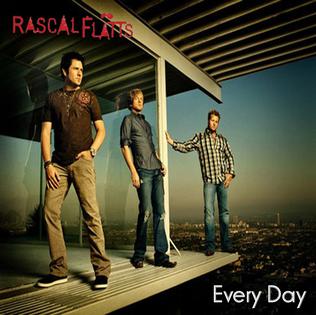
"Every Day" is a song written by Jeffrey Steele and Alissa Moreno and recorded by American country music group Rascal Flatts. It was released in March 2008 as the third single from their album Still Feels Good. It became their nineteenth consecutive Top 10 hit, reaching #2 on the Billboard Hot Country Songs charts. The song earned a Grammy nomination for Grammy Award for Best Country Performance by a Duo or Group with Vocals
"My Baby Loves Me (Just the Way That I Am)" is a song written by American singer-songwriter Gretchen Peters and was first recorded by Canadian country music singer Patricia Conroy on her second studio album, Bad Day for Trains (1992). Her version was released in May 1992 as the first single from her album and peaked at number eight on the Canadian RPM Country Tracks.

"Wild Angels" is a song written by Matraca Berg, Gary Harrison and Harry Stinson and recorded by American country music artist Martina McBride. It was released in November 1995 as the second single and title track from McBride's album of the same name. The song reached number one on the US Billboard Hot Country Singles & Tracks charts, giving McBride her first number one single on that chart.
"Whatever You Say" is a song written by Ed Hill and Tony Martin and recorded by American country music artist Martina McBride. It was released in February 1999 as the fifth and final single from McBride’s album Evolution. The song peaked at number 2 on the US Billboard Hot Country Songs and at number 37 on the Billboard Hot 100. It also peaked at number 6 on the Canadian RPM chart.

"Love's the Only House" is a song written by Buzz Cason and Tom Douglas, and recorded by American country music artist Martina McBride. It was released in November 1999 as the second single from her album Emotion.
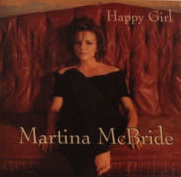
"Happy Girl" is a song written by Beth Nielsen Chapman and Annie Roboff, and recorded by American country music singer Martina McBride. It was released in April 1998 as the third single from McBride’s album Evolution. It reached a peak of #2 on the U.S. country chart and #4 on the Canadian country chart.
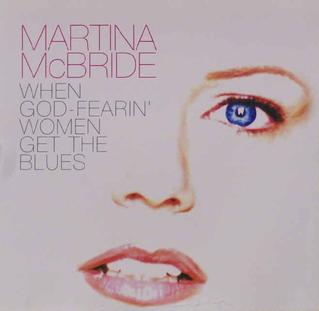
"When God-Fearin' Women Get the Blues" is a song by American country music artist Martina McBride, recorded for her Greatest Hits (2001) compilation album. The song was written by Leslie Satcher and produced by McBride and her frequent collaborator Paul Worley. The song was chosen as the lead single from the compilation by RCA Records Nashville on June 25, 2001.

"Life #9" is a song written by Kostas and Tony Perez, and recorded by American country music artist Martina McBride. It was released in January 1994 as the second single from her album The Way That I Am. The song was her fifth single release overall, and peaked at number 6 on the U.S. Billboard Hot Country Singles & Tracks chart and at number 8 on the RPM Country Tracks chart in Canada.

"Wrong Baby Wrong Baby Wrong" is a song by American country music recording artist Martina McBride, recorded for her tenth studio album Shine (2010) and is the opening track to the album. The track was written by The Warren Brothers, a duo made up of brothers Brad and Brett Warren, Robert Ellis Orrall, and Stephen Barker Liles of the duo Love and Theft. Sent for country radio on February 1, 2010, the song not only was her first single release of the 2010's, but was also her final single released under RCA Nashville Records, the label she had been signed with since 1991.
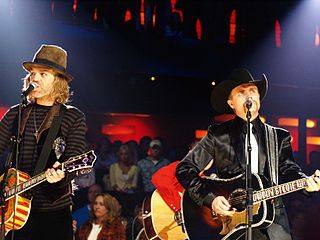
Big & Rich is an American country music duo composed of Big Kenny and John Rich, both of whom are songwriters, vocalists, and guitarists. Before the duo's foundation, Rich was bass guitarist in the country band Lonestar, while Kenny was a solo artist for Hollywood Records.

















